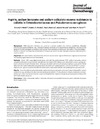Please use this identifier to cite or link to this item:
https://accedacris.ulpgc.es/jspui/handle/10553/75840
| Title: | Aspirin, sodium benzoate and sodium salicylate reverse resistance to colistin in Enterobacteriaceae and Pseudomonas aeruginosa | Authors: | Malla, Cristina F. Mireles, Natalia A. Ramírez Corbera, Ana Sofía Poveda Guerrero, José Bismarck Tavío Pérez, María Del Mar |
UNESCO Clasification: | 32 Ciencias médicas 3209 Farmacología 3207 Patología |
Keywords: | Aspirin Pseudomonas aeruginosa Colistin Enterobacteriaceae Sodium benzoate |
Issue Date: | 2020 | Journal: | Journal of Antimicrobial Chemotherapy | Abstract: | BACKGROUND: MDR bacterial infections are currently a serious problem for clinicians worldwide. Klebsiella pneumoniae and Enterobacter spp., among Enterobacteriaceae, and Pseudomonas aeruginosa, are part of the group of ESCAPE pathogens or bacteria that 'escape' from common antibacterial treatments. The lack of effectiveness of the first common line of antibiotics has led to the search for new therapies based on older antibiotics, such as colistin. OBJECTIVES: We searched for new enhancers of the action of colistin against MDR Gram-negative bacteria that can be easily applicable to clinical treatments. METHODS: Colistin MICs were determined alone and with the protonophores CCCP, sodium benzoate, sodium salicylate and aspirin using the broth microdilution method and FIC indexes were calculated to assess synergy between colistin and each chemical. Time-kill assays of colistin with and without protonophores were performed to determine the bactericidal action of combinations of colistin with protonophores. Likewise, the effect of sucrose, l-arginine and l-glutamic acid on the MICs of colistin alone and combined with each protonophore was assessed. RESULTS: It was found that sodium benzoate, sodium salicylate and aspirin, at concentrations allowed for human and animal use, partially or totally reversed resistance to colistin in P. aeruginosa and highly resistant enterobacterial strains. The mechanism of action could be related to their negative charge at a physiological pH along with their lipid-soluble character. CONCLUSIONS: Sodium benzoate, sodium salicylate and aspirin are good enhancers to use in antibiotic therapies that include colistin. | URI: | https://accedacris.ulpgc.es/handle/10553/75840 | ISSN: | 1460-2091 | DOI: | 10.1093/jac/dkaa371 | Source: | Journal of antimicrobial chemotherapy [1460-2091], v. 75 (12), p. 3568-3575, (Diciembre 2020) |
| Appears in Collections: | Artículos |
SCOPUSTM
Citations
11
checked on Jun 8, 2025
WEB OF SCIENCETM
Citations
10
checked on Jun 8, 2025
Page view(s)
153
checked on Feb 3, 2024
Download(s)
403
checked on Feb 3, 2024
Google ScholarTM
Check
Altmetric
Share
Export metadata
Items in accedaCRIS are protected by copyright, with all rights reserved, unless otherwise indicated.
